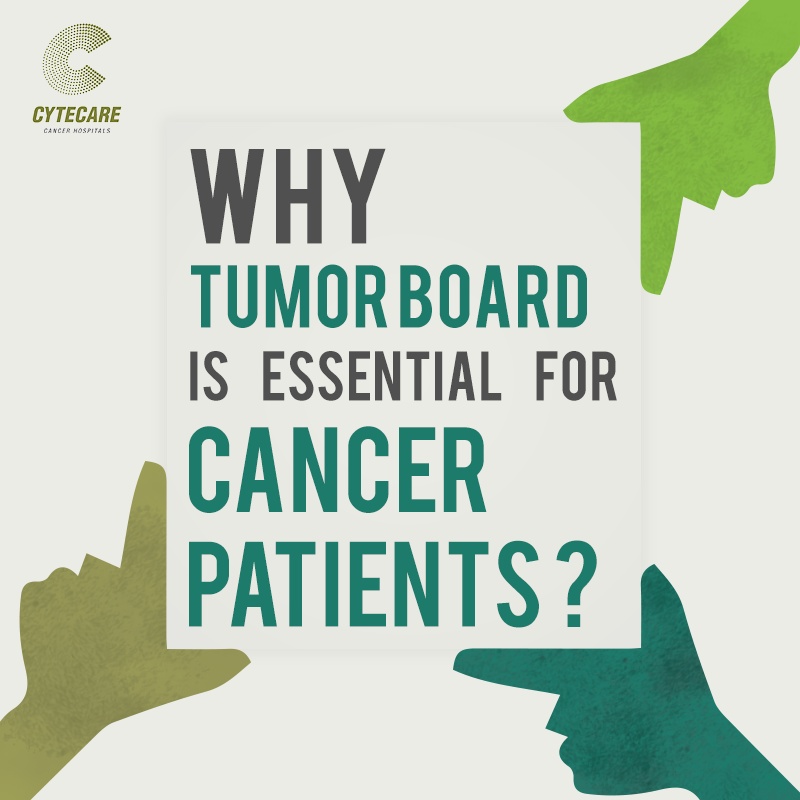Understanding The Tumor Board: Approach to Cancer Care
Cytecare’s multidisciplinary approach to cancer care; the Tumor Board- Why is it needed?
Cancer treatment is often a multi-modality approach and may include either one or a combination of surgery, radiation therapy, chemotherapy and/or immunotherapy. Unlike other diseases, in cancer management, more than one specialist is often involved in the treatment of various phases of the disease trajectory.
In a conventional set-up, a patient will have to bear the responsibility of moving from one specialist to another, explaining case history, treatment received so far, test undergone, etc. An already overwhelmed cancer patient and their caregivers may find this exercise quite taxing and also lack the expertise to handle the case. Additionally this approach of “one specialist at a time” leaves no room for structured engagement between the various specialists to discuss the case in a comprehensive manner.
Hence, a need for coordinated care involving multiple physicians and specialized expertise to manage cancer care is pivotal. A multidisciplinary approach, where inputs from a patient’s primary oncologist, surgeons, radiologist, etc are integrated for the purpose of diagnosis, planning and care of cancer greatly benefits the patient.
It is being increasingly realized among the medical fraternity that a multi-disciplinary approach to cancer treatment, improves medical management and presents a new standard of care for diagnosis and treatment planning. This approach is facilitated through the tumor board.
What is a Tumour Board?
A tumour board is a meeting of speciality consultants, treating physicians and other healthcare professionals involved in the treatment of a challenging case. They review unusual or complex cancer cases and decide on the treatment modalities to come up with the best possible line of treatment ahead.
Pertaining to the multidisciplinary treatment approach cancer demands, it is of crucial importance that the patient undergoing treatment gets a holistic approach in treatment where doctors of various disciplines have to discuss the treatment process during the different cancer stages. Every cancer patient being different from another, the aim of a tumour board is to discuss the patient’s case among various disciplines and come up with a better strategy and treatment plan.
At Cytecare, the board consists of oncology specialists such as a surgical oncologist, Medical Oncologist, Radiation Therapist, Radiologist, Pathologist, Pain and Palliative Oncologist, etc. Our tumor board specialists meet on a regular basis to review each and every cancer case.
The purpose is to approve in consensus with all specialists the quality of care and to ensure that the cancer patient has access to the best and current treatment in cancer management. During our meetings, we diligently review all the patient images, pathology reports, etc and discuss the treatment plan and diagnosis.
Several case studies have shown that tumor board meetings improve and optimize treatment planning.
Some of the distinct advantages of multi-disciplinary care include
- Improved Patient care
- Staging Accuracy
- Receiving care in accordance with clinical practice and standard guidelines.
- Improved communication
- Cost-effective care
- Improved clinical and patient satisfaction
The Cytecare Tumor Board Advantage:
- Cytecare Cancer Hospitals are committed to upholding the best global standards and treatment guidelines.
- Cytecare is intensely networked with some of the global oncology experts. When needed, our tumour board seeks recommendations from specialists across the world via video conferencing so as to access the best clinical opinions which of course, undergo a rigorous review before being implemented.
- Our tumour board also consists of Organ-site specialists, depending on the cancer type. (Example- Breast Cancer, Head & Neck Cancer). This allows us to balance the tenets of organ-site focus with standardized guidelines.
Cytecare’s Tumor Board Members:
-
Medical Oncologist
-
Surgical oncologist
-
Pathologist
-
Radiologists
-
Radiotherapist
-
Pain and palliative care expert
- Medical Oncologist usually treats cancer using chemotherapy, or other targeted therapies like hormone therapy and immunotherapy. This oncologist may also oversee a patient’s general care and coordinate treatment with other specialists. A patient is most likely to visit their medical oncologist for long-term regular check-ups.
- A surgical oncologist, on the other hand, is specially trained in removing the tumour and nearby affected tissue during an operation. A surgical oncologist may also be called in to perform a biopsy during a cancer diagnosis.
- A pathologist is a doctor who closely studies the cause and development of a disease. They specialize in interpreting laboratory tests and evaluating cells, tissues, and organs to diagnose the progress or stages of cancer in a patient.
- Radiologists are medical doctors (MDs) or doctors of osteopathic medicine (DOs) who specialize in diagnosing and treating diseases like cancer using medical imaging techniques, such as x-rays, computed tomography (CT), magnetic resonance imaging (MRI), nuclear medicine, positron emission tomography (PET) and ultrasound.
- A Radiotherapist may also be known as a Radiation Therapist or a Therapeutic Radiographer, and as the name suggests, work in radiation oncology. They are the ones who usually plan and administer radiation treatments to cancer patients. Certain radiotherapists may also prescribe medications and radiation, interpret tests results, perform follow-ups, reviews, and provide consultations to cancer patients.
- Pain and palliative care expert is a physician with special training in evaluation, diagnosis, and treatment of all different types of pain, including pain from cancer and associated treatments. The expert may not necessarily focus on the cause of the ailment as a way to eliminate pain and rather look to make the patient as comfortable as possible. Pain management experts at Cytecare always co-ordinate with other doctors on the case to ensure that there is no conflict of medication prescribed. This ensures that the patient’s treatment is not hindered or jeopardized in any way.





